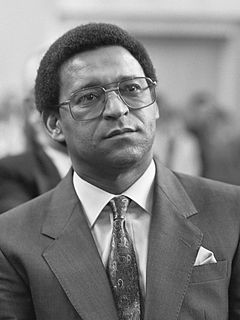A Quote by Robert Jeffress
"The way of Cain" refers to any individual who attempts to approach God on his or her own terms rather than on God's terms.
Related Quotes
We never try to convert those who receive (aid) to Christianity but in our work we bear witness to the love of God's presence and if Catholics, Protestants, Buddhists, or agnostics become for this better men - simply better - we will be satisfied. It matters to the individual what church he belongs to. If that individual thinks and believes that this is the only way to God for her or him, this is the way God comes into their life - his life. If he does not know any other way and if he has no doubt so that he does not need to search then this is his way to salvation.
In many respects, the United States is the freest country in the world. I don't just mean in terms of limits on state coercion, though that's true too, but also in terms of individual relations. The United States comes closer to classlessness in terms of interpersonal relations than virtually any society.
To some, the image of a pale body glimmering on a dark night whispers of defeat. What good is a God who does not control his Son's suffering? But another sound can be heard: the shout of a God crying out to human beings, "I LOVE YOU." Love was compressed for all history in that lonely figure on the cross, who said that he could call down angels at any moment on a rescue mission, but chose not to - because of us. At Calvary, God accepted his own unbreakable terms of justice. Any discussion of how pain and suffering fit into God's scheme ultimately leads back to the cross.
If God wishes to be born as man and to unite mankind in the fellowship of the Holy Ghost, He suffers the terrible torment of having to bear the world in its reality. It is a crux; indeed, He Himself is His own cross. The world is God's suffering, and every individual human being who wishes even to approach his own wholeness knows very well that this means bearing his own cross. But the eternal promise for him who bears his own cross is the Paraclete.
I believe the word "infidel" is not particular to any religion. I believe we are all created in the image of God, in fact, we are all God, or at one with God, at our deepest core essence. I think "infidel" refers to one who does not believe that God is none other than the Self. The "infidel" is the individual personality who identifies with the body and thoughts and not the Divine Indweller. Therefore we are all "infidels" save the sacred few who have transcended the notion of the limited self. The ancient mystics of all tradtitions have said this.
...we see God working in terms of Jewish culture to reach Jews, yet, refusing to impose Jewish customs on Gentiles. Instead non-Jews are to come to God and relate to Him in terms of their own cultural vehicles. We see the Bible endorsing, then, a doctrine we call biblical sociocultural adequacy in which each culture is taken seriously but none advocated exclusively as the only one acceptable to God.
It is one of the ironies of religious history that many mortals err in their understanding of the nature of God and end up rejecting not the real God but their own erroneous and stereotypical image of God. Frequently this is because they have thought of God solely in terms of thunderings at Sinai without pondering substance. . . .


































